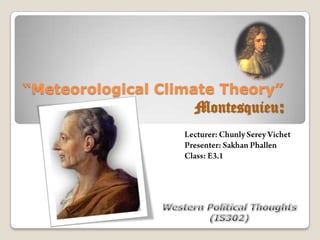Meteorological climate theory
•Download as PPTX, PDF•
1 like•2,979 views
Meteorological Climate Theory of Montesque
Report
Share
Report
Share

Recommended
More Related Content
What's hot
What's hot (20)
Traditional And Modern Approaches of Political Science

Traditional And Modern Approaches of Political Science
Viewers also liked
Viewers also liked (16)
Similar to Meteorological climate theory
Similar to Meteorological climate theory (20)
Topic of discussion Uptopian IdeasRequired Textbook 

Topic of discussion Uptopian IdeasRequired Textbook
Topic Political SystemsInstructionsExplain how conservat

Topic Political SystemsInstructionsExplain how conservat
More from Helen Sakhan
More from Helen Sakhan (20)
Dis is307 alternatives to developmentalist approach corporatism and others

Dis is307 alternatives to developmentalist approach corporatism and others
Meteorological climate theory
- 2. Content: I. Background II. Forms of government III. Meteorological Climate Theory IV. Reflection towards theory V. Conclusion
- 3. Background Baron de Montesquieu (1689 - 1755) A French social commentator and political thinker Best known works: Lettres Persanes – The Persian Letters (1721) L’Esprit des lois – The Spirit of the Laws (1748)
- 4. Background (Cont’) If the laws are appropriate, if the proper “Spirit” is observed in their formulation and application, the stability of the society will be preserved.
- 5. Forms of Government According to Montesquieu, there are three forms of government: Republican (Democracy & Aristocracy) – education must teach to love of country. Monarchy - education should teach the paramountcy of self- interest. Despotism – education should teach of servility.
- 6. Forms of Govt. (Cont’) A government’s corruption, “begins with that of its principles.” It’s important to have the proper kind of equality in a democratic republic, the spirit of equality. A natural aristocracy, leaders and people should have equal under the law. In monarchy, power is demand to share among nobility, clergy, courts, cities, and king. For corruption of despotism is impossible because it is already corrupt.
- 7. Forms of Govt. (Cont’) A republic requires a small territory. Larger republics are endangered by internal factions, while republics that are too small susceptible to invasion. How to escape from such dilemma? The establishment of a confederation. Still this theory is ingenious.
- 8. Meteorological Climate Theory Climate, soil, economics, religion, customs, and traditions must all be considered. According to Montesquieu, “the people of hot climates are more effeminate, weaker, less brave, more slavish, more given to pleasure than are their fellows in the cold climate.” Montesquieu also correlates religion with political forms: Mohammedanism is associated with despotism Catholicism with monarchy Protestantism with republicanism
- 9. Meteorological Climate Th. (Cont’) Climatic conditions are directly related to economics, occupation, customs, and traditions, and thus indirectly to constitutions. Montesquieu says that all factors considered influence man and mold a “General Spirit” within a nation which must be taken into account by legislators and leaders. So, the function of legislators is to discover and understand the spirit, not to change it.
- 10. Reflection toward theory Disagree => “A republic requires a small territory.” Agree + Disagree => “The people of hot climates are more effeminate, weaker, less brave, more slavish, more given to pleasure than are their fellows in the cold climates.”
- 11. Conclusion There are three forms of government according to Montesquieu, republican, monarchy, and despotism. All factors such as climate, soil, economics, religion, customs, and tradition influence the physiology and psychology of a people, determine their character in which institutions they live. People of hot climate tend to be inferior to the people of cold climate. General spirit within a nation which must be taken into account by legislators and leaders.
- 12. Q & A
